- Home
- Jeremy Robinson
Forbidden Island Page 5
Forbidden Island Read online
Page 5
Of course, National Geographic had once attempted the traditional approach, and before the crew even reached the shore, the director’s leg was skewered by an arrow. That expedition had come to a violent, bloody end before it had truly even begun. And few people had attempted contact since, and never with better results.
Sitting beside Mahdi was a man named Emmei, their ship’s captain, who was tapping his hands on his knees and bopping his head to music only he could hear. He was descended from local Andamanese parents who had left the tribe and joined the modern world, working for the resort.
He physically resembled the Sentinelese people, but not overtly. His skin was a few shades lighter, and his facial features less pronounced. Thanks to a calorie-rich diet supplied by ‘civilization’, he also stood eight inches taller than Sentinelese men, whose stature had been reduced by millennia of living on an island with limited resources. Despite there being only twenty miles of ocean between the two islands, the two tribes had been separated for hundreds of generations. But the biggest diversion between the population was language. While many island tribes in the region could communicate, the Sentinelese spoke a language all their own.
Deciphering it would not be easy. She hoped Mahdi was up to the task.
Beside Emmei was Winston Rhett, a pudgy American documentary filmmaker. After a brief Google search on his phone, which would cease working a mile off shore, Rowan had determined the man had never actually released a movie. But that didn’t seem all that important as he was documenting the expedition for the Indian government—not for mass consumption.
Sashi sat at the end of the single row of chairs, flipping through a binder full of notes. When the lights dimmed, she whispered to herself, stood, and headed for the podium at the front of the room.
Mr. Ambani hustled from the back of the space, where he had dimmed the lights, and sat down beside Rowan, eyes alight, radiating excitement.
Talia leaned back in her chair, arms crossed. She wasn’t expecting to learn anything new. Rowan, on the other hand, opened a notebook, clicked a pen and prepared to take notes.
“I’m impressed,” she whispered to him.
“I don’t like to make mistakes.” He smiled, but it wasn’t genuine. In her experience, men who didn’t like to make mistakes had usually made more than a few.
“Sorry for the delay. You’ve all been very patient, and I thank you for that.” Sashi opened her binder, flipped through pages and picked up a small remote, clicking the button once. A rectangle of light blazed on a hanging video screen behind her. When Talia’s eyes adjusted, she saw a projected photo of North Sentinel Island.
“This is where we will be spending the majority of our days,” Sashi said. “North Sentinel Island. Though we will likely remain offshore, pending a breakthrough. I’m going to briefly cover what the public knows about the island, and then reveal a few things that are not widely known.”
Sashi looked up and squinted at Mahdi, whose hand was raised. “There will be time for questions when I’m finished.”
“Why are we here?” he asked.
“I’m getting to that.”
“I believe you should lead with that,” he said.
“I agree,” Talia said. “I’m honestly still undecided about whether or not this is a good idea.”
“What I meant is, why us?” Mahdi motioned to Talia and Rowan. “We couldn’t have been your first choice.”
“Also a good question,” Talia said. Her respect for Mahdi was growing. He might not be adventurous, but he was intelligent and no-nonsense.
“You will get your answers,” Sashi said. “But please, let me provide a little context.” She looked at Talia. “Not everyone knows as much about the Sentinelese as you do, and even your knowledge is limited.”
Mahdi crossed his legs and leaned back, acquiescing to Sashi’s request.
Talia took Sashi’s last comment as a challenge, but kept her mouth shut. She had studied North Sentinel Island while getting her master’s degree, but that was years ago, and it was possible things had changed. After all, the government did seem to be in a hurry to make peaceful contact.
When no one else spoke, Sashi switched to the next slide. It showed a hazy photo of a naked black man on a pristine beach. The man had his arm cocked back, a spear ready to throw. “There are a handful of photos and two short videos of the Sentinelese people, none of them very high quality. We know they are small in stature, yet well built, with frizzy hair and very dark skin. They are a pre-Neolithic culture, wearing nothing aside from belts—for supply pouches—and occasionally decorative headbands. They are armed mostly with spears and bow and arrows, tipped with iron pillaged from shipwrecks and shipping containers that washed up on their beaches. They have also been seen wielding long shards of metal, mounted on wooden handles, like swords or short scythes.”
That’s new, Talia thought, but she didn’t ask about it. The Sentinelese had access to pillaged iron for years. It wasn’t surprising that they had figured out how to make new weapons from their finds. They wouldn’t have the technology to forge the metal, but they could tie metal scraps to branches. Tribes like the Sentinelese survived by being creative and innovative in ways an American with a car, grocery store, bank account, and iPhone couldn’t fathom.
“There have been a few well-documented encounters over the years.” Sashi clicked to the next image, an aerial photo of a cargo ship floundering on the reefs around North Sentinel Island. “The first was in 1867, after a British surveyor working for the East India Company noticed a ‘multitude of lights’ on the island. The resulting expedition was driven away under a cloud of arrows, or so the men claimed. That same year, a merchant ship was stranded on the island, we now believe intent on enslaving its people. One hundred and six marooned men fended off attacks for several days before being rescued. We know there were casualties, but we do not have a concrete number. Perhaps the biggest offense against the Sentinelese people occurred in 1880, when an expedition led by Maurice Portman stormed and searched the island, finding paths. The tribe eluded them until Portman found and kidnapped an elderly couple and four children. The couple died and the children were returned, no doubt telling stories that solidified the Sentinelese view of the outside world for generations to come. There were several more brief landings during the British occupation of India, but all were met with violence and repelled.
“In more modern times, between 1967 and 1975, the Indian government sent exploratory parties to the island, hoping to make peaceful contact, much like we will be. But again, they were greeted violently and sent away. In 1974, National Geographic, shooting the documentary ‘Man in Search of Man’, sent a group of anthropologists, with very different ideas from Talia, along with armed and armored policemen and a small film crew. Their efforts led to the director being shot in the thigh, and the expedition was called off.”
“Their first mistake was leaving a plastic baby doll on the beach.” Talia couldn’t resist pointing out the stupidity of this gesture. “Can you imagine? Seeing a baby, unmoving and made of plastic? They have no concept of plastic, or of toys, or of white babies. It’s no wonder they speared the thing and buried it in the sand.”
“Thank you for the elaboration, Talia.” Sashi nodded, and then she pointed at the cargo ship on screen. “This is the Primrose. She ran aground during a monsoon in 1981. The crew was stranded on the reef for a week and reported being shot at by fifty Sentinelese warriors. They believed they would be boarded. The crew was rescued by helicopter, but they were found locked inside the ship and in a state of near panic. Some of the survivors, now elderly, were recently questioned about the ordeal. They discussed previously unrevealed details. This recording is from a man named Harold Stack.”
Sashi held up her phone and hit the play button in an audio app.
“They were everywhere,” Stack said, his voice gravely with age.
“On the beach?” a male interviewer asked.
“On the deck. Everywhere. In the
water. We ran. Just ran. They shot the lights out. Banged on the door all night. Trying to get in. It was…was…”
“Was what?”
“I—I’m not supposed to talk about it.”
Sashi lowered the phone. “That was the last thing he said. He died two weeks later. We were able to speak with the helicopter pilot, who circled the island and took this photo. He didn’t see the Sentinelese, or the boats the Primrose captain mentioned in his mayday message, or any arrows, spears, or other signs of attack. However, he did recall the exterior lights being broken, as one man cut his foot on a shard and bled in the chopper.”
Sashi updated the image. It showed a small fishing boat washed up on the island’s shore. “Now, as far as the public record goes, most modern contact ends there, with the exception of a single incident in 2006. There is a three mile exclusion zone around the island. Anyone found inside it faces heavy fines and jail time.”
“But not us,” Mahdi said.
Sashi seemed thrown by the comment, but then said, “Of course not. But in 2006, two men spent the day fishing off North Sentinel Island. That night, they dropped anchor and went to sleep. It is believed that the ship drifted to shore during the night when the anchor failed. The two men were slain. If you are squeamish, you might want to look away.”
Talia noticed that no one looked away, and Mr. Ambani leaned forward, elbows on knees. The image updated to the slain bodies of two Indian men, their throats slit, their bodies covered in puncture wounds and their limbs broken at severe angles.
“That was not a defensive killing,” Talia pointed out. “That was rage.”
Sashi nodded, “And I’m sorry to say it is not an isolated incident.”
The image changed, revealing two men and a woman lying in the back of a boat, similarly mutilated. Then again. A fishing vessel with four men slain. Then again, six young men, all dead, surrounded by empty beer cans, but not by a single arrow. Sashi moved to click the button again, but stopped. “There are, sadly, five more incidents that have been kept from the world. The total death toll is thirty-two.”
“That’s why we’re going,” Talia said.
“I don’t understand,” Mahdi said. He looked mortified, and rightfully so.
“If the Sentinelese have killed this many people, exclusion zone or not, they’ve been deemed a danger to modern society. People are always going to do stupid things—” She motioned to Mr. Ambani. “No offense.” Though she meant offense, “—so the government needs to take action to either bring the Sentinelese into the modern world, or exterminate them.”
Mahdi bristled. “I will take no part in the—”
“We’re not here to exterminate them,” Talia said. “We’re their last chance at survival. If we can’t make peaceful contact with the Sentinelese, their 65,000 year occupation of their island is going to come to an end.”
6
Rowan couldn’t sleep. The past few days of travel and subsequent jetlag left his body exhausted, but the gears of his mind had discovered the secret of perpetual motion. He had prescription sleep aids, but it was already 3am. He’d need to be awake and alert in just three hours. He could manage that with little sleep and a lot of coffee, but not with Ambien swirling through his veins and dulling his mind. Normally, he’d find solace in the bottle, drinking enough to cloud his worries and make him sleepy without the hangover.
But that wasn’t an option now. The contract he’d signed with Sashi, which also included a non-disclosure agreement, stipulated that he would be fired, without pay, if he so much as sipped an alcoholic drink. He’d signed the document before knowing they’d be staying at a resort fully stocked with every spirit known to man.
But he could manage it, he believed. He wasn’t an alcoholic after all. He knew that opinion was a stereotypical alcoholic thing to believe, but he had gone years without a drink in between stints of heavy drinking. Those breaks were spurred on by circumstances, such as the moment Sashi had crossed his path.
The only reason I want a drink now, he thought, is because of the stress.
Protecting these folks from a tribal people with a history of deadly violence, was outside his wheelhouse. He was a skilled soldier. Deadly with a gun or a knife, but he had never been a mercenary before, let alone a bodyguard.
He looked up at the night sky, blazing with stars. Despite growing up in the woods of New Hampshire, the Milky Way appeared far brighter here. It reminded him of Afghanistan, a country in which he had seen beauty only at night. In the stars. Until those stars had become points of light descending from the sky, in the wrong place, killing the wrong people.
A warm breeze tickled his head. It made him wonder if he had a few strands of his hair longer than the rest. He had shaved it himself, so it was possible. He made a mental note to check, and continued his walk through the collection of villas that were the Sandal-Foot Resort. During the day, the villas looked well-constructed and modern. Everything rustic about them was an illusion, meant to make guests feel like they were roughing it. But at night, in the near total darkness, the villas looked like authentic jungle huts.
Rowan rounded a bend in the manicured path and stopped. Unlike the other villas, which were dark and quiet, the villa nearest the beach—Talia’s—showed signs of life. The orange glow of firelight flickered in from between the cracks in the drawn, wooden blinds.
Mothlike instinct drew him toward the light, but as he walked nearer, he found himself becoming concerned. The huts didn’t have fireplaces. It was far too hot here, all year long, to justify even a romantic flame. Candles seemed the likely culprit, but sleeping with lit candles in a villa built from wood, and covered by a faux grass roof was a recipe for human barbecue.
His pace quickened with his pulse. The amount of light seemed too bright for a candle or two. He didn’t see or smell smoke, but if the blaze had just started… He slipped into a jog, ready to sound the alarm, when a shadow moved across the window, slow and unconcerned.
Talia was awake, and not screaming.
But what was she doing?
Feeling just a little bit like a creep, he slid toward the glowing window.
Talia was…different. There were moments when she seemed normal, usually when she was talking about the modern world, or the science behind her work. That was when her intellect took over, and she gave off the vibe of an adventurous, funny, and intelligent woman. Someone he might even be interested in. But sometimes…sometimes she had a look in her eyes. He didn’t know how to describe it other than dangerous. Maybe it was because she had put a poison arrow tip against Sashi’s neck when they had first met. First impressions and all that. He had written it off as a bluff, but who really knew what she had done while living with that Peruvian tribe? What she had told them was borderline scandalous. But what hadn’t she told them?
He tried to steady his breath as he approached the window, but he couldn’t help but feel like what he was doing was wrong. He’d been concerned at first, but if Talia was awake, and not panicking, then her villa wasn’t on fire. Curiosity urged him on like a teenage boy, daring him to see what maybe he shouldn’t.
Rowan stopped at the sound of Talia’s voice. Was she speaking to someone? Was she not alone? He strained to hear, but could only make out one voice, and he couldn’t understand a single word. She wasn’t speaking English.
He straddled the shrub growing beneath the glowing window and leaned closer. Orange light filled his view. The villa, like his, was a single large room with an open concept bathroom, though the toilet had its own small closet-sized space with a door. Palm trees in a framed painting appeared to sway in the light cast by several flickering candles. The queen-sized bed was still made, an unpacked backpack lying atop its tropical colored quilt.
Motion snapped him rigid, breath held. A shadow danced across the wall, awkward, the motions rigid and insectoid.
The dance paused. The shadow grew larger, dancing once more as the candle flames shifted.
Talia strolled into vi
ew, her naked body seen in thin segmented lines.
Rowan’s heart pounded, not because he was seeing Talia naked—he had already seen her naked—but because he knew he was now squarely in the wrong and needed to leave without being caught or his stint as a bodyguard would be short-lived.
He began to lift his leg up and over the shrub when he heard her voice again, the sound muffled through the window, but again, not English.
She wasn’t speaking any language he knew.
One leg raised like a urinating dog, Rowan squinted through the blinds. Hints of red lines covered naked skin. Or was that the firelight playing tricks on his eyes?
A leaf rustled beneath his foot.
Talia’s voice became a whisper. Her body stopped moving.
Rowan lifted his leg over the shrub.
Shit, shit, shit.
Talia’s shadow grew larger, her heels thumping on the floor.
The unforgiving ground punished Rowan for his indiscretion as he dove and rolled out of view. Orange light blazed from the window as the blinds were drawn up. Rowan stayed motionless on the ground, watching Talia’s candlelit shadow wobble on the footpath where he had stood just a moment before.
The shadow shrank as she retreated, and then the light dulled in stages. She’s blowing out the candles, Rowan realized, scrambling to his feet. As soon as that last candle was out, and her eyes adjusted to the dark, she would be able to see more easily.
After a moment of indecision, he hurried past her villa toward the beach. Had he returned the way he’d come, she would have seen him leaving. As he walked, he thought, I should have just knocked. Told her I saw the light and was concerned. He would have left out peeking through her window, but could have told her the truth.
The way he’d handled it probably left her feeling vulnerable and afraid.
The sand squeaked beneath his feet. The ocean’s waves lapped against the shore, far calmer than his pounding heart. He leaned down, hands on knees, and smiled. Then laughed. It had been a long time since his mischievous high-school years. How many motel rooms had he and his friends peered through while whittling down six packs?

 Alter
Alter From Above - A Novella
From Above - A Novella Flux
Flux Tether
Tether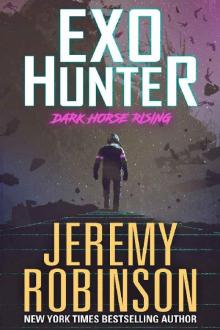 Exo-Hunter
Exo-Hunter Pulse
Pulse Cannibal
Cannibal Omega: A Jack Sigler Thriller cta-5
Omega: A Jack Sigler Thriller cta-5 Flood Rising (A Jenna Flood Thriller)
Flood Rising (A Jenna Flood Thriller) Viking Tomorrow
Viking Tomorrow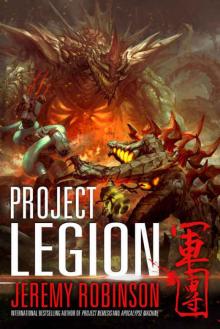 Project Legion (Nemesis Saga Book 5)
Project Legion (Nemesis Saga Book 5) BENEATH - A Novel
BENEATH - A Novel Kronos
Kronos SecondWorld
SecondWorld XOM-B
XOM-B Forbidden Island
Forbidden Island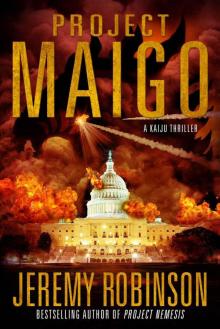 Project Maigo
Project Maigo The Last Hunter - Descent (Book 1 of the Antarktos Saga)
The Last Hunter - Descent (Book 1 of the Antarktos Saga)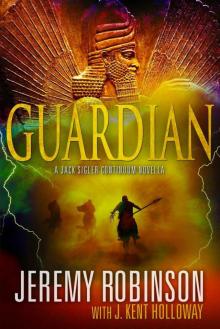 Jack Sigler Continuum 1: Guardian
Jack Sigler Continuum 1: Guardian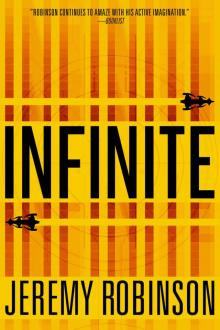 Infinite
Infinite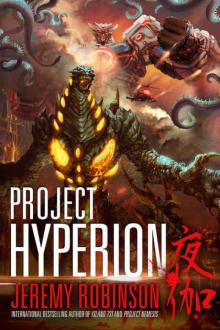 Project Hyperion
Project Hyperion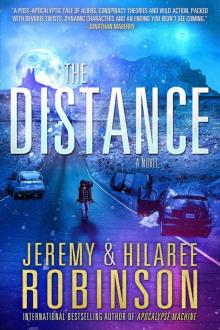 The Distance
The Distance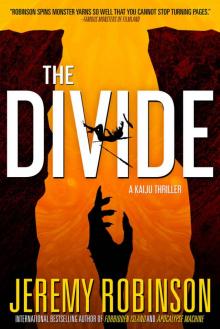 The Divide
The Divide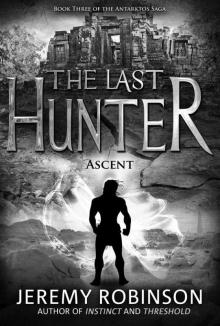 The Last Hunter - Ascent (Book 3 of the Antarktos Saga)
The Last Hunter - Ascent (Book 3 of the Antarktos Saga) The Last Hunter - Pursuit (Book 2 of the Antarktos Saga)
The Last Hunter - Pursuit (Book 2 of the Antarktos Saga)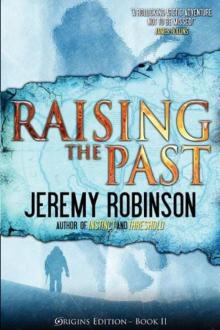 Raising the Past
Raising the Past The Others
The Others The Last Hunter - Collected Edition
The Last Hunter - Collected Edition Threshold
Threshold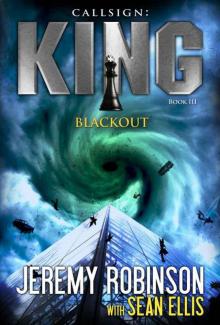 Blackout ck-3
Blackout ck-3 Antarktos Rising
Antarktos Rising Viking Tomorrow (The Berserker Saga Book 1)
Viking Tomorrow (The Berserker Saga Book 1) The Didymus Contingency
The Didymus Contingency Savage (Jack Sigler / Chess Team)
Savage (Jack Sigler / Chess Team)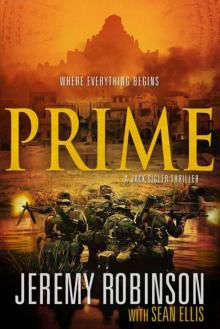 Prime
Prime Insomnia and Seven More Short Stories
Insomnia and Seven More Short Stories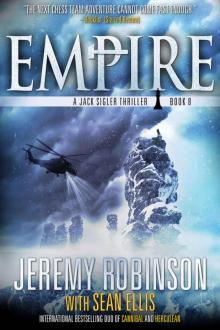 Empire (A Jack Sigler Thriller Book 8)
Empire (A Jack Sigler Thriller Book 8)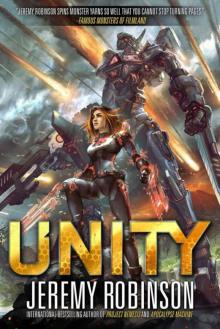 Unity
Unity Instinct
Instinct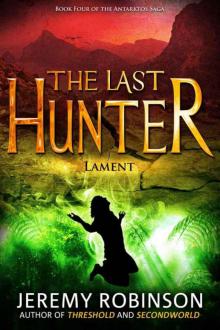 The Last Hunter - Lament (Book 4 of the Antarktos Saga)
The Last Hunter - Lament (Book 4 of the Antarktos Saga)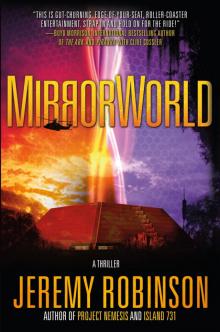 MirrorWorld
MirrorWorld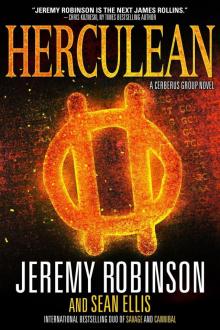 Herculean (Cerberus Group Book 1)
Herculean (Cerberus Group Book 1) Island 731
Island 731 Omega: A Jack Sigler Thriller
Omega: A Jack Sigler Thriller Patriot (A Jack Sigler Continuum Novella)
Patriot (A Jack Sigler Continuum Novella)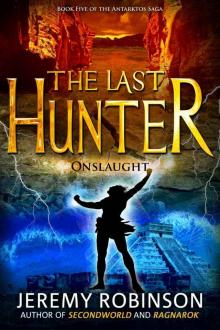 5 Onslaught
5 Onslaught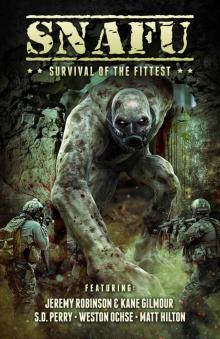 SNAFU: Survival of the Fittest
SNAFU: Survival of the Fittest Helios (Cerberus Group Book 2)
Helios (Cerberus Group Book 2)